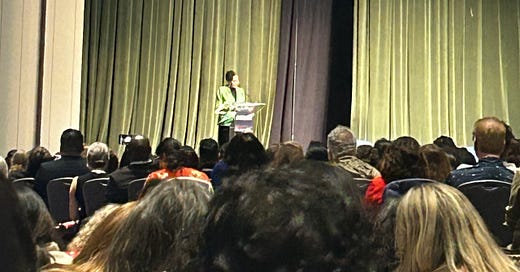The Racist War on K-12 Education
What scholar Kimberlé Crenshaw says about the anti-CRT frenzy.
Yesterday, I drove to Philadelphia to attend the American Educational Research Association’s Annual Meeting. I’ve never been to this conference before, but it’s a magical place where the world’s best thinkers in education come to meet and discuss trends and emerging science across more than 2,500 in-person sessions. (I want to take a second to thank my paid subscribers, because they help to fund these reporting trips — and therefore play a big role in ensuring that I can share the latest, most interesting research with you here.)
I made it to the conference yesterday just in time for a plenary lecture by Kimberlé Crenshaw, a leading scholar of Critical Race Theory who is a law professor at both Columbia and at UCLA. Crenshaw is famous in part for coining the term “intersectionality” in a 1989 paper, and she is the co-founder and executive director of the African American Policy Forum.
Crenshaw was a dynamic and powerful speaker. Among other things, she talked about where the war against wokeness and Critical Race Theory originated (thanks, Christopher Rufo) and how it is continuing to harm education around the country. “The consensus is that we've been on an upward trajectory away from our troubled origins — until recently,” Crenshaw said. Now we are in the midst of a “war against woke. It is not a battle for the next election; it's a battle for the next century.”
If you’re wondering how a scholar of Critical Race Theory defines CRT, Crenshaw described it as “the study and recognition of how and why laws and policies that are supposedly colorblind still produce racially inequitable outcomes.” Put another way, she said, “it is a necessary prism to understand how a racially unjust status quo continues to exist even in the face of colorblind laws.” And many, many politicians are working hard to prevent kids from learning about this reality and why it matters.
I’m not going to try to summarize Crenshaw’s entire amazing talk here, but I do want to highlight some of the educational trends she cited that are incredibly alarming and affecting students all around the country — as well as some suggestions she had for setting things right.





